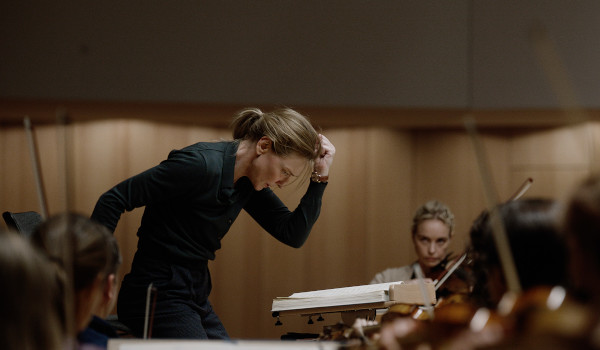TÁR
As writer/director Todd Field's film opens, we meet the formidable Lydia Tár (Cate Blanchett) at the height of her power. One of the greatest living composers, and the first female chief conductor of the Berlin Philharmonic, Tár seems to have it all. However, as Field's character study delves deeper in the conductor's life we begin to see cracks in the veneer which will eventually lead to her downfall.
After the suicide of a former colleague and secret lover (Sylvia Flote) whose career she sabotaged following their break-up, Lydia is haunted by hallucinations of screaming, music, and familiar designs which have no source. She's further troubled by a lawsuit from the woman's family alleging how Lydia misused her power which are followed by similar allegations in a New York Times article suggesting further improprieties of Lydia grooming young women for years leading to a social media maelstrom.
The film is built around the character of Lydia and Blanchett's performance. Immensely talented, we witness several examples of in the film's first hour including through interviews about herself and music which could easily have been explored in their own film. Given her talent, those around her are eager to ignore more troubling aspects of her personality in support of her genius (which, in a self-serving turn, helps them as well). However, once the tide turns, it doesn't take long for Lydia's less-than-kind treatment of others to catch up with her.
This is evident early on in a dressing down of one of her students during a lecture which is edited out of context and goes viral just as public opinion has begun to sour on the maestra, cropping back up much later in the film. What's interesting about that scene is it shows the complexity of the character in both her horrible behavior to a young student but also providing her with a valid argument worthy of discussion about not dismissing the music of an artist solely for their non-musical failings (which, of course, ties back into her own foibles as well).
Other aspects and performances worthy of note include Lydia's relationship to her assistant (Noémie Merlant), whose emotions the conductor plays with once too often, and her family life with her wife (Nina Hoss), who takes an inordinate amount of time to become aware of what is happening, and young daughter (Mila Bogojevic) which may be the only healthy relationship in Lydia's life. We also meet the young celloist (Sophie Kauer) who catches Lydia's eye, reminding us even after the sky has started falling down on her, Lydia still can't fight certain urges which will become her undoing.
Rather than spend the majority of time in Lydia's fall from grace, the film instead spends its time examining the woman's life, with the slowly widening cracks as it foreshadows the looming doom to come. This does mean the final half-hour feels a bit rushed leading to an ending that isn't quite as satisfying as I'd like giving the lengthy journey to get there. I'll also admit to feeling a bit squeamish about Field making the lesbian character a groomer given the negative stereotypes often prescribed to the entire LGBTQ community by right-wing bigots (even while admitting that the plot point does work well specifically for this character as the themes it is exploring are abuses of power not specific to any one sexual orientation).
The film may lose a bit of its way toward the end and fails to payoff all of its groundwork on screen. However, even with these minor complaints, TÁR is, more often than not, an elegant piece of filmmaking which hinges on Blanchett in yet another marvelous performances which has already garnered her attention for awards consideration. How it tells the story, and what and when it choose to reveal, is as interesting as the subject matter (sometimes more so). In the end, the film is a beautifully conducted piece of music highlighted by a top-notch solo by its star which steals the show.
Watch the trailer- Title: TÁR
- IMDb: link





